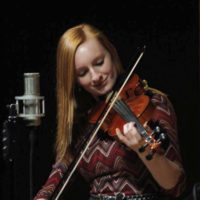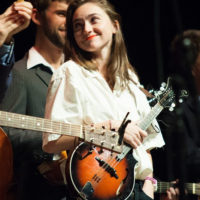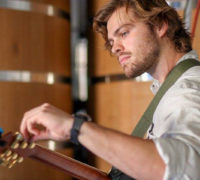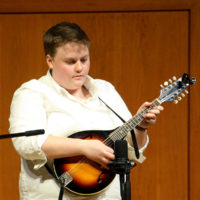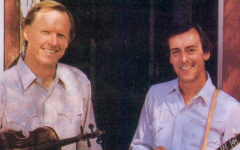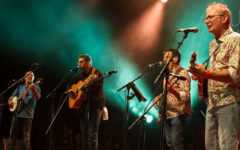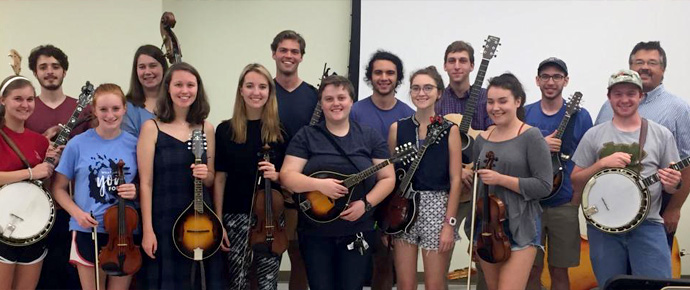
Two years ago, Bluegrass Today talked with Russell Johnson, Ensemble Director, and Professor Jocelyn R. Neal, Associate Chair, Department of Music, about the establishment of the bluegrass music program at the University of North Carolina (UNC) at Chapel Hill’s Music Department.
In this feature we speak to four of the students – Sarah Zelasky, Maddie Fisher, Jon Beyle, and Carter Hodge – about their involvement in the music program and participation in the UNC’s Carolina Bluegrass Initiative, of which the Carolina Bluegrass Band is the rotating performance combination – there was an intake of 17 in one year – that is not only a showcase for the talent in the program, but a part of the audition and examination process.
The students learned about stagecraft, sound design, and band management alongside performance.
Sarah Zelasky is from Raleigh, North Carolina, and she owes her love for music to her mother, an elementary school music teacher in Wake County Public Schools System.
During her high school years, she played piano in a jazz band, sang in the choir and in school musicals, among other activities.
Moving on to college, Zelasky joined multiple UNC ensembles including the Women’s Glee Club, the Marching Tar Heels and Charanga Carolina (a salsa band), before, in her senior year, becoming a member of the Carolina Bluegrass Band.
How did you become interested in music/bluegrass music?
I fell in love with the Duhks, a Canadian folk band when I was nine and my parents took me annually to the Lake Eden Arts Festival (LEAF). Since my discovery of fiddle through their band, I learned violin in my middle school orchestra, played in the Triangle Youth Orchestra, and took fiddle lessons “by ear” from Vickie Montague in Raleigh, North Carolina. I took a bit of a fiddle break in high school as I explored French horn, colorguard, and ukulele. When in college, I didn’t feel that my classical skills were good enough for the UNC Symphony (having always played second violin in orchestras), but I loved the expression that came with fiddling.
What prompted you to join this course, and what were the essential elements as they pertained to you and your entrance-level experience of bluegrass music?
I literally just saw a flyer in the music hall, lol. I missed Irish fiddling, and playing violin in any way, so I decided to join – best decision of my senior year at UNC.
I auditioned in Spring 2017 but, the band already had all the fiddle spots full for the semester. I auditioned again in Fall 2017 and was accepted into Carolina Bluegrass Band. It was definitely a bit of a learning curve to propose and arrange my songs (much different than learning traditional Irish fiddle songs by ear) but, participating in the band gave me opportunity to express myself through music and also gain confidence when surrounded by many talented musicians.
Would you tell me a bit about your experiences during the course and how important was learning the history of bluegrass in the context of learning to play the music?
The course only met two hours a week, so we spent most of our time arranging songs and rehearsing with only a bit of focus on bluegrass history when a new song was introduced.
How beneficial was the course in the context of your musical ambitions?
Learning bluegrass was extremely important to my development as a musician. Before the Carolina Bluegrass Band, I would rarely volunteer to take solos or do improvisation on breaks. Russ and my bandmates really encouraged everyone to step up and take their shot at soloing, so I learned to develop my own breaks as well as create fillers to back up the other musicians in my band. I did not realize how confident I had become at improvisation until I recently joined a new band and found myself constantly volunteering to take solos – something I never would’ve done two years ago. The style of the music itself and the environment created by my bluegrass bandmates made coming to rehearsals a great break from my rigorous and stressful college work.
I hope I can continue my participation in similar bands as an escape from my professional career life once I finish graduate school a year from now.
Zaleski is now an Environmental Health graduate student at the Harvard T. H. Chan School of Public Health, studying air pollution emissions related to transportation and their health consequences.
Currently, she plays violin with the Harvard College Latin Band and sings with the Longwood Chorus for Boston-area medical and health professionals.
Maddie Fisher grew up in Morehead City, North Carolina; she graduated from UNC in May, with degrees in Music and Environmental Studies.
While there, Fisher was first and foremost a vocal major, and so her career aspirations revolve around singing, songwriting, and accompanying herself with mandolin/guitar.
What prompted you to join this course and what were the essential elements as they pertained to you and your entrance-level experience of bluegrass music?
I had just picked up the mandolin when I first heard about the course, and I figured playing in the ensemble would be great practice. The department had historically only offered classical or jazz-oriented opportunities, and bluegrass or other folk/traditional styles were more in line with what I saw myself pursuing post-grad.
Would you tell me a bit about your experiences during the course?
There have been some really cool moments. I’ve been with the ensemble since its first semester, so I’ve been able to see most all that has happened. I was lucky to be able to open for the Steep Canyon Rangers with a few other Carolina Bluegrass Band members, which was scary but so cool. I was also a part of a group that opened for Hank, Pattie & the Current at the Cat’s Cradle, which was awesome exposure.
I took mandolin lessons from Russell. I’ve also been a part of opportunities to play smaller gigs on and off of campus with Carolina Bluegrass Band. Additionally, the ensemble inspired a research project that I worked on, with help from Dr. Jocelyn Neal, looking at the perspectives of bluegrass musicians from coal mining communities and how their music plays a part in local activist efforts. This work was supported by the Summer Undergraduate Research Fellowship and the Mildred Mayo Research fund. It resulted in a bluegrass and coal showcase that I put on with a few other Carolina Bluegrass Band members, along with a paper that is coming out in the next volume of the UNC journal of undergraduate research.
How important is learning the history of bluegrass in the context of learning to play the music?
I think that bluegrass history is important in that it shows you where all of the classics and standards came from, which are so much of what you play as a bluegrass musician. The standards are essentially blueprints for newly-created bluegrass music. I think the history is also important because it shines a light on all of the voices and perspectives that have been missing from the bluegrass narrative, which going forward can encourage us to create spaces where contributions from different kinds of people can be supported.
What reasons would you give if you were to recommend the course?
I’d encourage anyone to take it because regardless of skill level, it will help you become a better musician. It’s also cool to be a part of an initiative that’s so new because we’re helping to shape it and its future.
How beneficial is the course in the context of your musical ambitions?
This course has been super helpful. I aspire to be a musician and songwriter, and this course has given me a ton of tools that are important in making that happen. Since joining, I’ve gotten really good at picking up harmonies and can work out mandolin breaks much more easily. I also just have a much better understanding of how the different layers and instruments of songs come together, which is important in being a good musician and band member.
Maddie Fisher (mandolin) is now a member of the Carrboro-based Dissimilar South, a “freewheeling band” specializing in “meaty, heart-breaking, and twisted southern Folk” music.
Jon Beyle is a Chapel Hill, North Carolina-native and now a graduate of UNC-Chapel Hill with an Exercise and Sport Science major, and minors in Coaching Education and Music. While at UNC he competed on the track and field team in the throwing events as well as in the multi-discipline events (decathlon, heptathlon).
Beyle, who has played guitar and sung since at middle school, started taking banjo lessons with Hank Smith through UNC in 2017, and, to a lesser extent, played the piano.
What prompted you to join this course and what were the essential elements as they pertained to you and your entrance-level experience of bluegrass music?
I joined the UNC Bluegrass Ensemble after taking the Bluegrass History course taught by Dr. Jocelyn Neal. I was a fan of bluegrass and traditional music when I heard it but, wasn’t too familiar with the specifics of it. My earliest and strongest memories of bluegrass came from The Andy Griffith Show watching The Dillards perform. After studying the genre and watching the band open for the Steep Canyon Rangers at Memorial Hall on campus, I decided this would be a great opportunity to learn and perform another style of music.
The essential elements of being in the ensemble performing bluegrass were simply to have an open mind and be willing to immerse yourself in the genre. Russell Johnson is great at taking students with little or no bluegrass experience and teaching them the subtleties of the style while not squashing their own unique musical talents. Along with some musical talent, as long as you came in willing to learn more about bluegrass and put in the work to better yourself, you had the prerequisites for the ensemble.
How important is learning the history of bluegrass in the context of learning to play the music?
Learning the history of bluegrass is important in getting to the core of the music itself, however, one of its beauties lies in the “jamming” nature of the genre. Bluegrass is a music meant to be played with others and, in my experience, it is a welcoming community. Even when I was barely scraping the surface of bluegrass history, I was welcomed to bluegrass jams and encouraged to play as much as possible. Since I’ve become more experienced, I’ve been able to play bluegrass with friends even when they know very little about it. In fact, introducing those with other musical interests to the genre brings new ideas and helps bluegrass to grow.
With that said, diving into the history of bluegrass gives you a deeper understanding and appreciation of the music. It can turn your view of the genre upside down. For example, the banjo is seen as such a symbol of the “redneck” American South, but how many people know its origin is traced back to Africa, coming over with the slaves? Always popular in bluegrass jams, the song Sitting on Top of the World was originally a blues song. In learning that this genre has various influences, I feel welcomed to bring my own influence and my own style to how I play this music, while still holding true to the bluegrass giants who have come before.
What reasons would you give if you were to recommend the course?
Through this course I met many amazing people who happened to be great musicians, and we were able to bond over the music that we were learning and playing together. The Director of the band, Russell Johnson, made every rehearsal fun. He did a great job utilizing the many talents in the band to play bluegrass while not trying to squeeze us into a mould and squash our unique interests and abilities. As with any ensemble at the University, this course can be a foray into the world of performance. Those with little stage experience will be given the opportunity to step into the spotlight, while more experienced performers can still learn from Russell and his years of professional music performance. Overall, anyone in this course will have fun and become a better musician and performer along the way!
How beneficial was the course in the context of your musical ambitions?
The importance of this course in my musical ambitions can’t be understated. Without being involved in the Bluegrass Ensemble I’m not sure that I would have the confidence to be publicly performing music as I am today. Before I joined, I was a “bedroom guitarist,” occasionally playing for family and friends. I learned so much through the course and fell in love with playing music with others. As I got a taste for performing onstage, I took the knowledge and experience I gained beyond school, starting a band with four other ensemble members. Our band, Sugar On Fire, started small, playing small events as favors for friends, and has grown into a larger part of our lives. In addition to Sugar On Fire I began writing and performing my own music as a solo act, hoping to somehow piece together a living by doing what I love: playing music. The Bluegrass Ensemble swung my life in a new, fun, incredibly rewarding direction.
Beyle is a singer/song-writer who performs solo and as the guitarist and lead singer for Sugar On Fire, the Triangle, North Carolina-based band that started in February 2018. All five members came together through their involvement in the Carolina Bluegrass Band.
Carter Hodge is the first recipient of the Joanne and Victor Marshall Bluegrass award (as presented by UNC Department of Music).
Hodge has been in the ensemble for five semesters. Having just graduated, Hodge is a double major in Women’s and Gender Studies and Music, with a creative writing minor in poetry.
How did you become interested in music/bluegrass music?
I have always been interested in music, since I was a kid. I started really young playing violin and piano, and learning classical music but, fell in love with guitar and other folk/bluegrass instruments toward the end of middle school. I’m primarily a guitarist and heard about the bluegrass band because my ex-partner and bandmate was in it. It seemed like the absolute best fit for me to contribute and grow as a musician in the department, given that I don’t really play classical. As soon as I got going with mandolin and the ensemble, I learned to love bluegrass and appreciate the ways it was making me a better musician.
What prompted you to join this course and what were the essential elements as they appertained to you and your entrance-level experience of bluegrass music?
I joined the bluegrass ensemble because I felt that as a popular/folky musician, there wasn’t much room for me in the music department. I was also intrigued by bluegrass, having not been exposed to it much prior to joining. Guitar was my primary instrument, but I was interested by and willing to play banjo, mandolin, and bass. The thing I’ve taken away most from starting at nearly no mandolin is the importance of locking in with your band rhythmically, and the ability to take breaks/solo.
At UNC how important was learning the history of bluegrass in the context of learning to play the music?
In terms of history, we didn’t actively learn too much about the history as we use our time to rehearse. However, bluegrass is such a culture with norms and expectations for how you play and interact that are really easily linked to history. So, by nature of learning to play bluegrass, you learn about Flatt & Scruggs, band practices/set ups, the culture of bluegrass jams, etc. Russ was also good about encouraging us to know who wrote our songs and made them famous, so we learned to appreciate what was a Scruggs tune, or a Bill Monroe song, or something that was more of a crossover.
What reasons would you give if you were to recommend the course?
I’d recommend the course to other musicians because bluegrass teaches so many important skills applicable to any kind of musician. You have to pay attention to dynamics, learn how to maintain energy and drive at all tempos, function as a band to complete the whole rhythm section, juggle solos, etc.
To me, it’s awesome that you can join the band even without much bluegrass experience. It’s challenging but, it feels often like there is nothing but growth to be had as people learn what bluegrass is and how to play it.
How beneficial was the course in the context of your musical ambitions?
Bluegrass helped me grow tremendously as a musician. I learned a lot about helping lead a band through rehearsals and gigs. I also went from playing zero mandolin to being a fairly competent mandolinist! Playing breaks and arranging songs carefully for bluegrass were skills that instantly translated to how I play with my other band. Bluegrass has improved me as a technical player and as a musician, in knowing my way around rehearsals, sound equipment, arrangements, sets and community.
Londoner (England) Carter Hodge is, like Fisher, a member of Dissimilar South, as well as playing with the Carolina Ukulele Ensemble.
You can follow the Carolina Bluegrass Band on their Facebook page.

